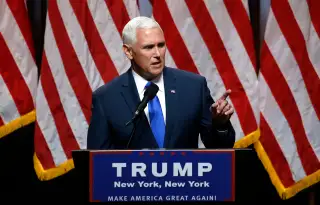Why Dads Should Care About Mike Pence's Comments on Working Moms

The first two days of the GOP convention have been, well, interesting, with accusations of plagiarism, references to Lucifer, and the pomp and circumstance of Donald J. Trump's official coronation as the Republican Party's presidential nominee.
Day 3 brings with it more serious fare, headlined by Indiana Gov. Mike Pence's vice presidential nomination acceptance speech — and introduction to the nation.
Pence has some explaining to do to two-income families.
In 1997, he penned a letter to the editor in The Indianapolis Star that criticized the growing trend of both parents working while sending their young children to day-care.
"Sure, you can have it all, but your day-care kids get the short-end of the emotional stick," Pence wrote. He said that he we wasn't condemning families who go this route, but was rather "criticizing a culture that has sold the big lie that 'Mom doesn't matter'."
Pence's letter was among several bits of past commentary that have been dug up by the press after Trump named Pence his running mate last week (in 1999 Pence wrote an article in which argued that the animated Disney movie Mulan was liberal agitprop, meant to change children's perception of women in the military.)
As for his daycare argument, that came in response to an article in The Indianapolis Star about the results of a three-year study by the National Institute of Child Health and Human Development on the effects of day-care on children.
History is not on Pence's side.
Four in 10 families with children under 18 have a mom who either makes all the money, or most of it, for her family, according to a 2013 Pew survey. That's up from 11% in 1960. More than 5 million of these moms are married with a higher income than their husband, while nearly 9 million are single moms.
Working moms, meanwhile, turn out to be excellent role models. One study found that daughters of employed mothers are more likely to have jobs, be in a position of responsibility and earn more money than the women of stay-at-home moms. At the same time, sons of working moms are more likely do their fair share of domestic duties - caring for family members and household chores.
The nature of parenting is also changing.
Dads are becoming more egalitarian in their views on child care, if not their actions. The vast majority of dads agree that their children should be the number one priority in their lives, and many struggle with the pressures of trying to maximize career ambition and time spent with their family. Today's dads spend more time caring for the kids and doing the dishes than their dads did.
But a number of fathers aren't living up to their ideal. A recent research report from the Boston College Center for Work and Family took a deep dive into the "attitudes and aspirations of millennial dad."
The study is full of interesting stats and findings, but one in particular stands out.
Millennials dads pretty much break down evenly into three distinct groups: "egalitarian," "conflicted," and "traditional." A third of dads said care-giving was and should be equal in their household (egalitarian); a third said the opposite — care-giving wasn't and shouldn't be equal between the parents (traditional). The remaining group said care-giving responsibilities should be equal between the parents but wasn't in their families (conflicted).
That group isn't living up to their ideals of parenthood.
This brings us back to Pence. Each family is different and creates its own rhythm that works for it. Maybe you want to be a stay-at-home mom or dad, maybe you want to work part-time, maybe you'd like to hire a nanny, maybe you like day care.
Finding that balance, while trying to be the best version of yourself at home and at work, is nearly impossible. Life is really hard. But when political leaders cast judgement on working moms, life gets even harder.
Working moms feel even less acceptance from a world that already penalizes them for having children. And the culture that pushes men to put their job ahead of their family, a culture that goes against their parenting ideals, only hardens.